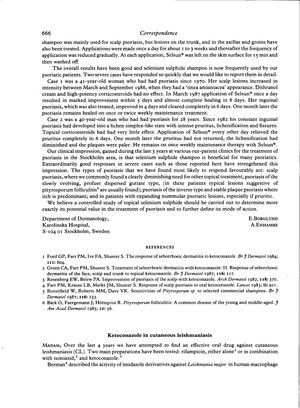Ketoconazole in Cutaneous Leishmaniasis
November 1987
in “
British Journal of Dermatology
”

TLDR Ketoconazole cured about 70% of cutaneous leishmaniasis cases caused by Leishmania major.
Over a 4-year period, more than 100 patients with cutaneous leishmaniasis were treated with ketoconazole, an oral antifungal medication. The treatment, which involved daily doses of 200-400 mg of ketoconazole for 4-6 weeks, resulted in a cure rate of approximately 70% for those infected with Leishmania major. The success of the treatment did not depend on the duration of treatment, the number or size of lesions, or when the treatment was started after infection. Ketoconazole's effectiveness is due to its disruption of sterol biosynthesis in the Leishmania organism. While the drug was ineffective against Leishmania major and Leishmania mexicana mexicana in laboratory animals and against Leishmania tropica and Leishmania aethiopica, it showed promising results in humans with Leishmania major. No side effects were reported, but monitoring liver function was recommended. Consequently, ketoconazole became the preferred oral treatment for CL caused by Leishmania major in the department where the study was conducted.





